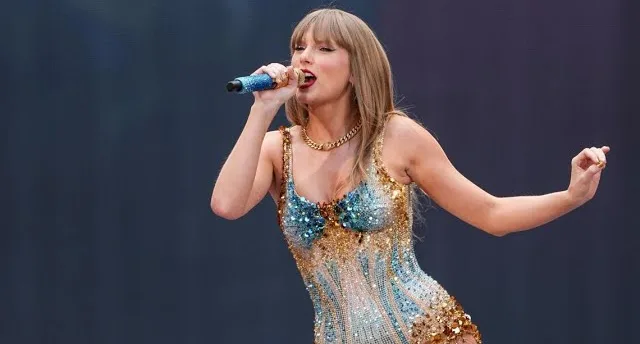The 2003 track ‘I Believe in a Thing Called Love’ soars to the top of the charts thanks to Swift’s enthusiastic rendition at a major public event.
In a spectacular demonstration of the influence of celebrity endorsements, Taylor Swift’s recent public display of enthusiasm for The Darkness’ 2003 hit, “I Believe in a Thing Called Love,” has catapulted the track to the Number 1 spot on various music charts. The boost in the song’s popularity came after Swift was filmed singing and dancing to the track while attending the US Open Women’s Final in New York on September 8, 2024.
The footage, which shows Swift joyfully singing along to the song with her boyfriend, Travis Kelce, at her side, quickly went viral across social media platforms. This surge in visibility has driven a remarkable resurgence in interest in the song, leading to a dramatic increase in its chart performance.
Embed from Getty ImagesThe term “Swiftonomics,” coined to describe the economic and cultural impact of Taylor Swift’s influence, once again proved its power as “I Believe in a Thing Called Love” soared to the top of the iTunes Rock Chart in the United States. The song also made significant gains on international charts, more than two decades after its original release.
On September 9, 2024, streams of The Darkness hit track surged by nearly 70% on Spotify, with global streaming of the band’s music increasing by approximately 60%. The uptick in streams and downloads reflects the broad reach of Swift’s endorsement, as well as the enduring appeal of the track.
The Darkness frontman Justin Hawkins expressed his gratitude in a heartfelt TikTok video, acknowledging the impact of Swift’s enthusiastic display. Hawkins shared a personal anecdote about attending a Taylor Swift concert with his daughter in Zurich, where they received exceptional hospitality. He described the viral video moment as a “heart-warming” experience and thanked Swift, Kelce, and tennis fans for their support.
Hawkins reminisced about Swift’s previous connection to The Darkness, noting her appearance in a 2016 Apple Music advertisement where she lip-synced to the song and danced around a home office. Hawkins praised Swift’s ability to elevate the song’s appeal, reflecting on her early support for the band and her ongoing connection to their music.
The resurgence of “I Believe in a Thing Called Love” serves as a testament to the potent combination of celebrity influence and nostalgic hits. Swift’s enthusiastic interaction with the song has not only rekindled interest among long-time fans but also introduced the track to a new generation of listeners.
Analysis:
Political:
The impact of Taylor Swift’s influence on the music industry reflects broader trends in celebrity culture and media. As public figures hold significant sway over consumer behaviour, their endorsements can drive substantial economic outcomes. This phenomenon illustrates the power dynamics within media and entertainment, where the preferences of celebrities can shape market trends and consumer habits.
Social:
Swift’s video underscores the social dynamics of fandom and celebrity influence. The enthusiastic response from fans highlights how celebrities can revitalize interest in past cultural artefacts, such as classic songs. This reflects a broader cultural trend where nostalgia and celebrity endorsement intersect to create viral moments that resonate with diverse audiences.
Racial:
While the specific event does not directly address racial issues, it is part of a broader discussion about representation and influence in media. The way in which different celebrities impact various cultural phenomena can reflect broader conversations about representation and the diverse ways in which audiences engage with popular culture.
Gender:
The situation highlights gender dynamics within the entertainment industry. Taylor Swift, as a prominent female artist, exerts considerable influence over popular culture and consumer behavior. Her ability to drive the success of a song through a simple social media interaction underscores the broader impact that female celebrities have in shaping cultural and economic trends.
Economic:
The resurgence of “I Believe in a Thing Called Love” due to Swift’s endorsement demonstrates the economic power of celebrity influence. The significant increase in streaming and sales reflects how media exposure and celebrity endorsements can drive substantial financial gains for artists and brands. This illustrates the economic value of celebrity endorsements in modern entertainment and marketing.
